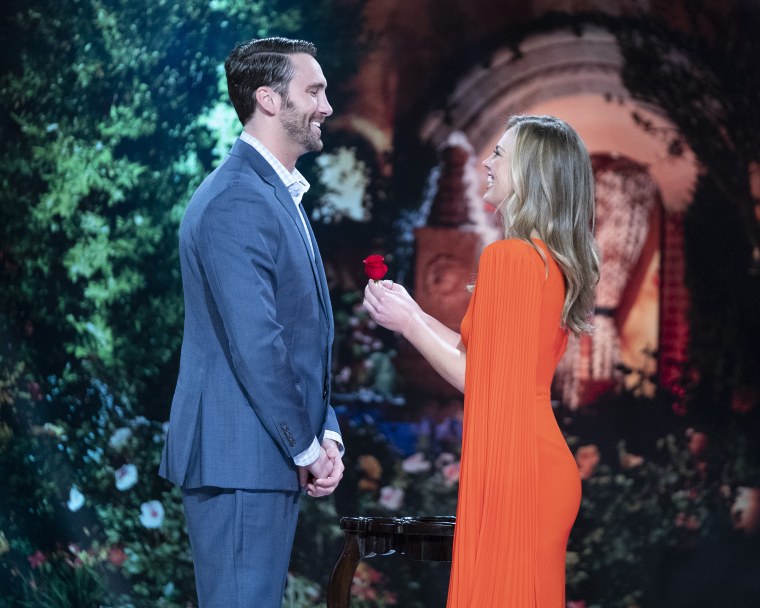Now that the 23rd season — yes you read right — of the ABC mega-franchise "The Bachelor" has reached its conclusion, it seems there’s nothing left to do but burn it all down and start from scratch. This show for once lived up to the hype and was inarguably “the most dramatic season” ever; there's really no topping this.
In case you live in a happy, pure place where you haven’t heard about The Guy Who Jumped A Fence (where, I assume, the words "Mueller investigation" also hold no meaning for you), this season reached its climatic (no pun intended) finish when noted 26-year-old virgin Colton Underwood, this season’s eponymous “bachelor,” got dumped by one of his final three women before their “fantasy suite” time (which is normally when the sexual action takes place). That launched Underwood into a tizzy of raw emotional fervor, during which he tore off into the cold, dark Portuguese night after he jumped over a sizable fence. He was ultimately located through some producer-and-host-led detective work that seemed to heavily rely on following the sounds of barking dogs.
Once taken back into production’s able-enough hands, Underwood said he was quitting the show — which ultimately meant that he broke up with the two remaining women, and spent the remainder of what one assumes was his contractually-obligated production time attempting to woo back the girl-who-broke-his-heart, Cassie Randolph, with a series of grand romantic gestures.
Or in "Bachelor" terms, he told her they didn’t have to get engaged and could just date, and he would basically wait around until she could be as in love with him as he was with her. For her part, she seemed to feel like she could relax, since all the other women were gone and the very premise of the show had been dismantled. (They also maybe then had sex — but who knows, and who cares.)
For the past few years, "The Bachelor" has been seemingly on a slow death march headed to this exact kind of conclusion in which the semi-wholesome rules of the show did not apply. In 2016, bachelor Ben Higgins told both of the two final women that he was in love with them, a statement previously verboten until a ring had been put on someone’s finger in the show’s finale. In 2017, the show's lead Nick Viall, had already appeared on "The Bachelorette" twice, "Bachelor in Paradise" once and had publicly slut-shamed a woman for not marrying him if she had sex with him. In 2018, lead Arie Luyendyck, Jr. picked the woman he felt was “marriage material,” Becca Kufrin, for his fiancée in the finale, only to then break up with her while cameras rolled weeks later after he had re-instigated conversation with the runner-up to whom he was more sexually attracted, Lauren Burnham.
The Luyendyck-Kufrin breakup was, at the time, arguably the most notable thing that had ever happened in the franchise’s history. The show's titular hero rubbed in viewers' faces that love — the currency given value year after year by the gross exaggeration and mishandling of heterosexual relationship tropes — was dead. After all, what else to make of the network's unrepentant airing of unedited footage of a man telling his television bride-to-be that he was not actually in love with her but was instead sliding into her one-time rival’s DMs. (Viewers, after all, watch the show for the fantasy, not for the worst bits of our own romantic realities.)
So when Colton Underwood simply decided the game was over, and decided that he needed to stop everything to prove to a woman who had just told him that she loved him but was not in love with him that she was actually very wrong and could fall in love with him given different circumstances and enough time — you know, the things that normally precede falling in love in real life — there felt like something beautiful was happening.
Colton and Cassie’s love story, as it were, was a public signaling that love couldn’t be "real" without the complete elimination of personal boundaries and contractual obligations, a grand romantic gesture of sorts offering the kind of external, public validation that a person living through an Instagram account in the year 2019 might need to show to themselves that they were, in fact, feeling things.
But with Underwood now having fully deconstructed the artifice and structure of the show, the question is what can happen for the franchise next — and what I hope this means is that the women of "The Bachelorette" will now be permitted to go off the rails as well.
To date, all of the show's female leads have done more or less what they have been told — that is, hewed to the show’s premise, followed the timeline and moved through the each week’s regulated activity — from spelling bees to meeting the parents to sex dates — as planned until one suitor remains and a proposal of marriage is accepted. "The Bachelorette" is infamous for its startlingly “good” track record, which is to say that most of the women do in fact stay with, marry and procreate with the men from whom they ultimately accept a Neil Lane ring in the end.
But next season’s bachelorette will be “Alabama Hannah” Brown, a.k.a. Hannah B., the girl who dubbed herself the “conductor of the Hot Mess Express.” With Hannah Brown, the franchise seemingly has on their hands an opportunity of a lifetime — the Platonic ideal of their desired mold of woman (Southern pageant queen) but is also completely camera un-ready (see: her repeated inability to speak in full sentences) and generally goofy.
And so, a modest proposal: Let the franchise finally explicitly be a weird act of performance art. Let’s see how long it takes the contestants to figure out that they haven’t left Los Angeles after repeatedly being put on planes and landing right back where they started (but being told they’ve acquired stamps in their passports).

Or better yet, let the bachelorette do whatever the hell she wants, sending home all the guys if she thinks they’re all self-involved dorks and then traipse around Europe with her best girlfriends and make out with strangers with whom she shares no common language. Let her keep as many men as she wants in the end and continue to date them all simultaneously. Let her pen angry letters to exes telling them all the ways they have wronged her. Let her tell everyone she loves them, tell no one she loves him, make a joke of the entire thing and count her growing social media presence all the way to the bank.
Let her not have to be defined by a man's televised love, or bolder still, by the constant societal pressure to do just what is expected of her when it comes to meeting other people’s goals and expectations of her romantic and professional pursuits. It is anything but surprising that, when women lead this show, they still oblige, joylessly going along with a formula that men have enthusiastically proved to be illegitimate at best, but it really should be.
So really — just let Hannah B. do whatever the hell she wants to do, and swim in rose petals and laugh at all the men's terrible lines like she would in real life. And if she falls in love, more power to her.



